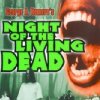Sadly, the British aren’t coming to the movies much any more. But in case you ever doubted that British cinema used to be a major player in the world of movies, here are my Top 20 favourite ones. Notice that last word: “favourite”.
Putting together this list, it became apparent that the British made three types of film really well. War films (not surprising, seeing as we’ve pretty much always been at war with somebody), comedy films (probably because we needed a laugh with all that war going on), and horror films (decide for yourself what this means!).
I’m not going to provide links here. In true British fashion, you can copy and paste these titles yourself if you want to learn more about them. I do hope you find something you may not have seen before. There are many more classic British films out there. So get scratching the surface…
Without futher ado, here is my definitely-non-definitive list.
20) 28 Days Later (2002)
Chilling zombie invasion movie transplanted to London.
19) The Lady Vanishes (1938)
Alfred Hitchcock outdoes himself in this flawless spy thriller that has been copied many times, for instance in recent hit movie Flightplan.
18) The Wicker Man (1973)
A bizarre horror musical that sees zealous policeman Edwad Woodward surrounded by some very creepy locals in the Scottish islands.
17) Saturday Night and Sunday Morning (1960)
Albert Finney’s star-making performance as a working class hero in 1960s Nottingham.
16) Dead of Night (1945)
One of the best horror movies ever made. It starts out like a stuffy play and gradually becomes more and more frightening, like a dream that’s closing in…
15) Kes (1969)
Ken Loach’s superb documentary-style kitchen sink drama with a famous football match.
14) Get Carter (1971)
The one where a naked Michael Caine dispatches thugs with a shotgun. Brilliant hardboiled revenge story.
13) In Which We Serve (1942)
Gripping and very affecting wartime drama. The scenes of the blitz are unforgettable. Stiff upper lips are everywhere.
12) The Loneliness of the Long-Distance Runner (1962)
Very understated, realistic story of how one boy winds up in one of Britain’s notious “borstals” — correction centres for young offenders. Biting social commentary.
11) Kind Hearts and Coronets (1949)
Alec Guinness shows off his acting versatilty by playing all the members of an ill-fated aristocratic family who fall victim to a murderous plotter in this charming and sly black comedy.
10) Great Expectations (1946)
David Lean does Dickens. John Mills puts in a sympathetic performance in this highly atmospheric version that has never been surpassed.
9) Henry V (1944)
Lawrence Olivier’s definitive version of Shakespeare’s play is replete with pageantry and stirring speeches.
8) Billy Liar (1963)
Another kitchen sink drama, but this time it’s a comedy. In fact, it’s one of the best comedies ever made. Tom Courtenay plays the eponymous hero who can’t help but fantasize when faced with his grim, Northern life.
7) The Bridge on the River Kwai (1957)
David Lean directs and Alec Guiness stars in this fantastic prisoner of war movie. Possibly the most famous whistling ever in the movies!
6) A Matter of Life and Death (1946)
Spellbinding movie which sees RAF pilot David Niven killed before his time and forced to argue before a Heavenly court why he should be allowed to return to Earth. Sound familiar?
5) Monty Python’s Life of Brian (1979)
So many Python films belong here, just because they are so very well made and… well, silly. But this is surely one of the silliest.
4) Lawrence of Arabia (1962)
The daddy of modern war films. Peter O’Toole plays the larger-than-life British military figure in this sweeping and epic production.
3) Dracula (1958)
aka The Horror of Dracula. This set the gold standard for vampire films for so many years to come, we’re still feeling its effects. Christopher Lee runs rampant as the aristocratic Count. The first of his many pairings with horror icon Peter Cushing.
2) Zulu (1964)
Fantastic action film about the actual events at Rourke’s Drift. The “300” of its day, a tiny outpost of British soldiers in Africa hold back the Zulu nation. Boys Own adventure material stuff with great stars and memorable theme music by John Barry.
1) Oliver! (1968)
This movie has it all. Unforgettable songs, amazing dance numbers, fantastic performances from the likes of Oliver Reed and Ron Moody, a story by Charles Dickens and a host of great characters. Who can forget murderer Bill Sykes being betrayed by his own dog? Or Fagin and the Artful Dodger dancing off into the sunset? Humour, social commentary, pathos, tragedy and triumph. Possibly the finest musical ever made.
Well that’s all, folks (to coin a phrase). Proof indeed that British cinema produced some of the most amazing films ever. And proof that it still has the potential to rise again like a pheonix from its own art-house ashes.
It is also noticeable that a lot of these movies come from the 1940s and 1960s, which were periods of great social change in Britain (as in most other places). Proof that great art comes from conflict of one kind or another.
As for the future? Well surely all those millionaires in the UK could follow George Harrison’s example and create a legacy for generations to come by investing in film? I can’t say that the demise of the UK film council has affected me, but maybe something will come along to replace it. Only time will tell. In today’s economy, nothing is certain. Let’s just hope we don’t face a future of middle-class romantic comedies. And there are only so many James Bond sequels you can make…





